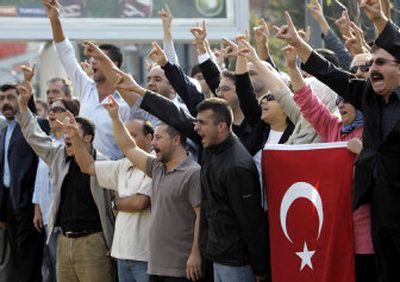Turkey finally discusses a volatile episode of its past

ISTANBUL, Turkey – A controversial conference on the mass killings of ethnic Armenians during the last days of the Ottoman Empire opened here amid heavy security Saturday in defiance of a court ban.
The forum was hailed by participants and Western observers as a groundbreaking event where Turkish academics for the first time publicly could challenge their country’s official version of the events leading to the Armenian tragedy.
Hundreds of protesters waving Turkish flags pelted the arriving panelists with eggs and rotten tomatoes, expressing the fury felt by many Turks over efforts to open their country’s painful past to debate.
“The aim (of the conference) … is to declare Turkey guilty of genocide,” said Erkan Onsel, head of the local branch of the small, left-wing Turkey’s Workers’ Party.
The conference was canceled twice before, most recently Thursday, when an Istanbul court ruled in favor of a group of lawyers who opposed the gathering on procedural grounds.
Turkey’s reformist prime minister, Recep Tayyip Erdogan, harshly condemned the ruling, saying it was timed to undermine the country’s efforts to join the European Union. Turkey is scheduled to open long-awaited membership talks with the EU on Oct. 3.
“I want to live in a Turkey where freedoms are enjoyed in their broadest sense,” Erdogan told reporters.
Emotions ran high among a packed audience of academics, journalists and diplomats as panelists deconstructed Turkey’s official explanation of how the country’s once-thriving Armenian population, estimated at more than 1 million in the early 20th century, was reduced to its current level of 80,000.
Armenians say more than 1 million of their people systematically were killed in a genocide campaign launched by Ottoman forces from 1915 to 1923. Turkey says several hundred thousand Armenians did die but of exposure, disease and attacks from brigands as they journeyed south to Syria after being deported for collaborating with invading Russian troops.
Most speakers took a cautious tone, saying the purpose of the conference was not to deliver a verdict on whether the killings constituted genocide.
“We cannot allow debate to be trapped between these two conflicting points of view. We need to try and understand what happened in 1915,” said Halil Berktay, a prominent Ottoman historian. He noted nonetheless that Ottoman officials had declared “an open season to hunt Armenians” at the start of World War I.
Hrant Dink, the managing editor of the Armenian language weekly Agos, said Saturday’s session would surprise Armenians across the world. “Some will now find the courage to enter into dialogue with the Turks,” he said.
Some participants expressed concern that they might face prosecution under Turkey’s newly revised penal code, which specifically proscribes description of the killings as genocide.